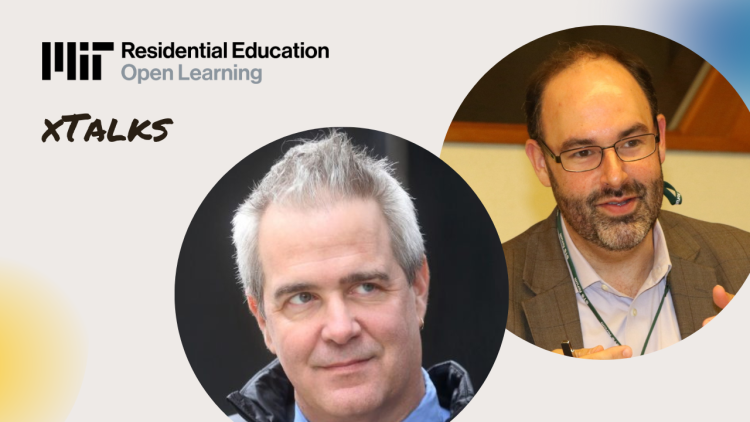You’ve seen the headlines about the impact of generative AI in education, but what is happening here in MIT classrooms?
Join for a presentation and panel discussion with two MIT faculty who are leveraging generative AI in their teaching. Learn about the positive impacts and the challenges associated with using generative AI in MIT subjects. Come to ask questions and hear from:
- Per Urlaub, Professor of the Practice in German and Second Language Studies, who teaches 21G.410. Professor Urlaub is also the Director of Global Languages.
- Michael S. Strano, Carbon P. Dubbs Professor in Chemical Engineering, who teaches 10.65. Professor Strano is also the Founder and Lead Principal Investigator for the Center for Enhanced Nanofluid Transport and for Disruptive and Sustainable Technology for Agricultural Precision.
Residential Education staff will also be available to share technical and pedagogical practices to support student learning. Attendees are welcome to participate in Q&A, and share their experience.
No RSVP required.
This session is Part 1 of the Fall Generative AI (GAI) in Teaching Series co-sponsored by MIT’s Office of Open Learning and the Teaching and Learning Lab. Learn about Part 2-Practical AI for Educators with Dr. Lilach Mollick and Part 3-GAI in Teaching: Faculty Learning Community.
Speaker Bios:
Per Urlaub teaches German and second language studies and investigates the impact of technology on languages usage, language acquisition, literacy, and intercultural development. Before joining MIT in 2022, he was a faculty member at the University of Texas at Austin and at Middlebury College, where he served as Associate Dean of the Language Schools. The author of numerous research publications and editor of three scholarly volumes, his research interests are located at the intersection of second language acquisition, literacy research, intercultural development, translation studies, international education, and technology. A main strand of his earlier scholarship generated a more nuanced understanding of the process of literary reading in the second language and directly impacted instruction and curriculum in post-secondary education. An authority on the strategic use of technology in higher education, his more recent scholarship focuses on investigating affordances and limitations of machine translation, generative AI, and geoinformatics in language education, intercultural learning, study abroad, and the humanities at large. Lastly, he is currently developing a digital humanities project focusing on the EU-funded “European Capital of Culture”-program that aims at generating a shared continental cultural identity in an era of growing nationalism in individual member states. He holds a PhD from Stanford University.
Michael S. Strano received his B.S from Polytechnic University in Brooklyn, NY, and Ph.D. from the University of Delaware both in Chemical Engineering. He was a post doctoral research fellow at Rice University in the departments of Chemistry and Physics under the guidance of Nobel Laureate Richard E. Smalley. From 2003 to 2007, Michael was an Assistant Professor in the Department of Chemical and Biomolecular Engineering at the University of Illinois at Urbana-Champaign before moving to MIT. His research focuses on biomolecule/nanoparticle interactions and the surface chemistry of low dimensional systems, nano-electronics, nanoparticle separations, and applications of vibrational spectroscopy to nanotechnology. Michael is the recipient of numerous awards for his work, including a 2005 Presidential Early Career Award for Scientists and Engineers, a 2006 Beckman Young Investigator Award, the 2006 Coblentz Award for Molecular Spectroscopy, the Unilever Award from the American Chemical Society in 2007 for excellence in colloidal science, and the 2008 Young Investigator Award from the Materials Research Society and the 2008 Allen P. Colburn Award from the American Institute of Chemical Engineers. From 2014 to 2015 he served as member of the Defense Science Study Group, and is currently an editor for the journals Carbon and Protocols in Chemical Biology. Michael was elected to the National Academy of Engineering in 2017.

